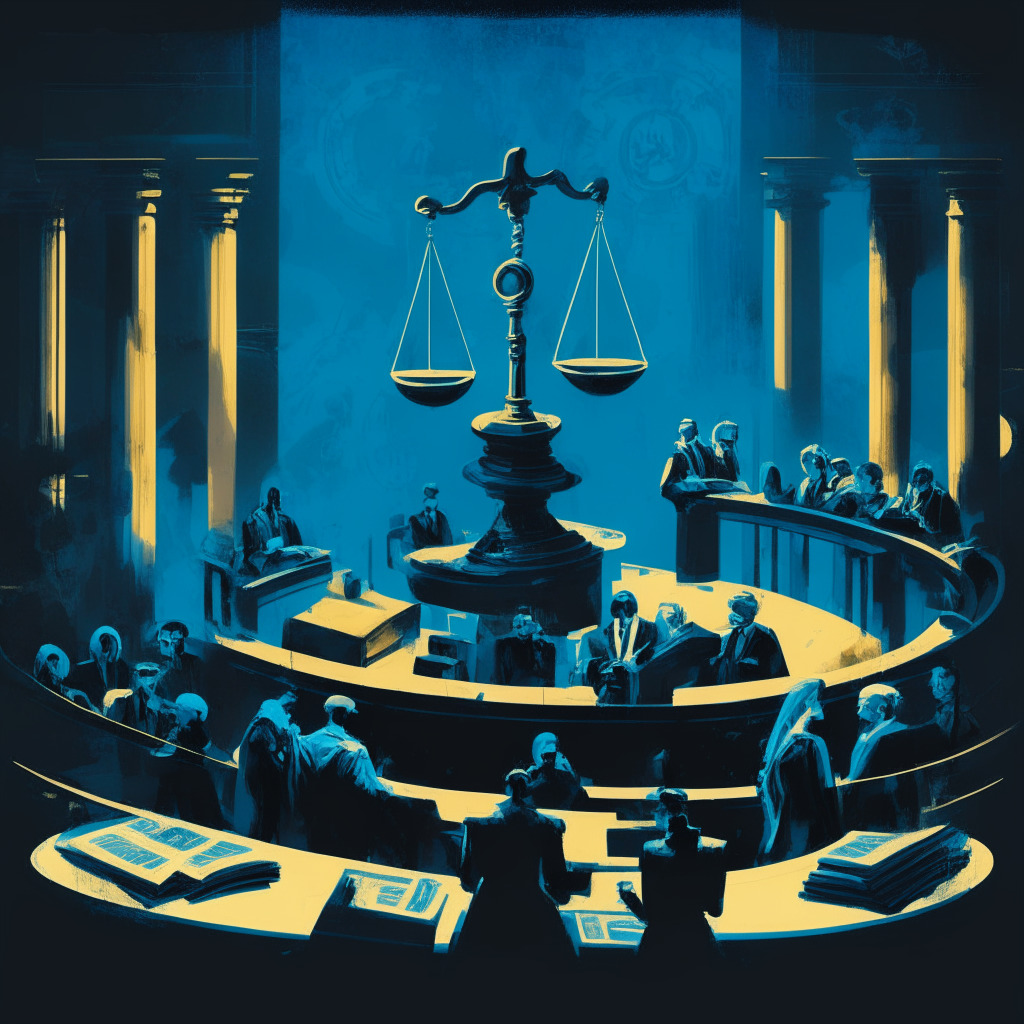Invesco submits a new application for a spot Bitcoin ETF, following major players like BlackRock and WisdomTree. The mainstream adoption of Bitcoin ETFs could potentially drive growth in the digital asset space. However, investors should remain cautious and conduct thorough market research before investing, as the market is volatile.
Search Results for: Applied Digital
Bitcoin’s $28k Surge and the Impact of Major Financial Institutions’ Crypto Initiatives
Bitcoin surged above $28,000 on Tuesday, marking the largest short squeeze this month as traders faced $36.6 million in liquidations. The surge coincided with major financial services institutions announcing crypto initiatives, including Deutsche Bank’s digital asset custody license application and BlackRock’s spot BTC ETF filing. These developments indicate increased exposure to digital assets in traditional finance.
Deutsche Bank’s Crypto Custody Move: A Shift Towards Acceptance or Centralization Concerns?
Deutsche Bank, Germany’s largest banking institution, has applied for a digital asset custody license from the German financial regulator BaFin, signaling a shift in attitude towards the crypto sector. While this move increases acceptance of digital assets, it also raises concerns about excessive centralization and potential regulatory challenges.
Deutsche Bank Dives into Crypto Custody: Milestone or Centralization Concern?
Deutsche Bank, with $1.3 trillion in assets, has applied for a digital asset custody platform license from Germany’s finance regulator. This move positions the bank to potentially establish a minimum viable product in 2021, signaling a significant step toward embracing digital assets in the traditional financial sector.
BlackRock, Grayscale, and the Battle for a Bitcoin ETF: Regulatory Hurdles Impacting Adoption
BlackRock’s application for a Bitcoin ETF with the SEC boosts investor sentiment, increasing Grayscale’s Bitcoin Trust share prices. The approval of a Bitcoin ETF could bridge the gap between crypto and traditional financial markets, influencing wider cryptocurrency adoption.
BlackRock’s Bitcoin ETF Attempt: Hope or Hurdle During Regulatory Crackdown?
Amid a stringent regulatory crackdown, BlackRock has applied for a Bitcoin ETF with the U.S. Securities and Exchange Commission. Despite previous rejections for other firms, BlackRock’s weight as a prestigious institution and successful SEC record sparks new optimism in the Bitcoin ETF race.
BlackRock’s Bitcoin ETF: A New Era or Another Roadblock in Crypto Adoption?
BlackRock, the world’s largest asset management company, has applied for a spot Bitcoin ETF, sparking excitement among crypto enthusiasts. Although previous attempts have faced resistance, the market’s maturation and the SEC’s recent approval of Bitcoin futures ETFs suggest a potentially brighter outlook.
SEC’s Crypto Crackdown: Protecting Investors or Stifling Innovation?
Gurbir Grewal, SEC’s Director of Enforcement, defends the agency’s actions against digital asset companies, citing the crypto industry as creating a “perfect storm of investor risk.” The SEC aims to combat fraud and protect investors rather than stifling innovation within existing regulations.
Regulatory Crackdowns Shift Crypto Traders to OTC Markets: Liquidity Crisis Looms
Crypto traders are increasingly seeking alternative liquidity sources in over-the-counter (OTC) markets due to regulatory crackdowns and reduced market depth on centralized exchanges. This shift towards OTC markets helps traders execute large transactions without relying on thin order books of exchanges, thereby gaining more prominence in the current situation.
Binance Withdraws from Cyprus: MiCA Compliance and the Future of Crypto Exchanges
Binance, the world’s largest cryptocurrency exchange, is withdrawing from Cyprus ahead of the EU’s Markets in Crypto Assets (MiCA) legislation in 2022. The company plans to focus on regulated entities in countries like France, Italy, and Spain, aligning its business with MiCA to ensure compliance. Tightened regulations and recent legal challenges may prompt a shift in the crypto landscape, emphasizing regulatory compliance.
Investigation Call on Ex-SEC Director’s Decentralization Speech: Ripple’s View on Clarity
Ripple’s chief legal officer, Stuart Alderoty, calls for an investigation into former SEC director Bill Hinman after unsealing documents related to his 2018 speech on Ethereum’s decentralization. Alderoty alleges Hinman ignored warnings and “invented factors” to determine decentralization, resulting in confusion and questions about the regulatory landscape of the crypto market.
Nike NFTs and EA Sports Integration: Revolutionizing Gaming or Inflating a Tech Bubble?
Nike’s NFT platform, “.Swoosh,” integrates with EA Sports games, while GameStop partners with Web3 gaming project Illuvium for an NFT collection called Illuvitars. These developments show NFTs’ growing impact across industries and their potential to transform how we interact with digital assets. However, risks and skepticism around emerging technologies remain.
Coinbase and SEC Clash: Analyzing Regulatory Frameworks and the Future of Crypto Oversight
Coinbase Chief Legal Officer Paul Grewal urged Congress to adopt a draft bill outlining a regulatory framework for cryptocurrency transactions, following a lawsuit by the SEC against the company. Grewal criticized the SEC’s enforcement-only approach, instead advocating for transparent legislation applied equally to all. The proposed bill aims to classify digital assets and determine regulatory authority.
SEC vs Coinbase Lawsuit: Balancing Regulation and Innovation in the Crypto Industry
The SEC lawsuit against Coinbase and Binance raises concerns over the US’ global competitiveness in crypto. Litigation, instead of legislation, damages companies committed to compliance. A well-defined regulatory landscape is crucial in preserving innovation and ensuring market transparency in the rapidly-growing crypto industry.
Taurus, Polygon, and the Rising Popularity of Asset Tokenization in Europe
Digital asset infrastructure provider Taurus integrates with Polygon blockchain, enabling clients to issue digital securities. With tokenization gaining popularity, Taurus draws interest from major banks like Credit Suisse and Deutsche Bank, blending traditional finance with innovative Web3 solutions.
Huobi Aiming for Hong Kong Crypto License: Pros, Cons, and Regulatory Hurdles
Huobi crypto exchange aims to obtain a crypto trading license in Hong Kong, with potential approval by year-end, according to Huobi advisor Justin Sun. The strategic relocation to Hong Kong positions the company closer to launching Huobi Hong Kong in the city that aims to become a virtual asset hub.
Navigating the Complex Crypto Landscape: Regulations vs. Adoption and Innovation
The reported events highlight the complicated relationship between cryptocurrencies and authorities, with regulators becoming stricter in a growing industry. Despite the uncertain landscape, positive steps towards adoption are seen in governments and the private sector, exemplifying progress and innovation.
Top US Brands Embrace Blockchain Technology: Potential Growth and Challenges Ahead
Top American brands like Chick-Fil-A, Toyota, and Kellogg are exploring opportunities in the Web3, NFT, blockchain, and digital wallet spaces. As these well-known brands embrace cryptocurrency and blockchain, skepticism wanes but challenges such as security and regulation remain.
Crypto Cybersecurity Regulation: The Benefits of Ambiguity and Self-Governance
David Schwed, COO of blockchain cybersecurity firm Halborn, suggests that crypto cybersecurity regulation should have “vague and ambiguous” guidelines, allowing self-regulation and growth within the industry. Flexible legislation accommodates rapid tech changes while supporting innovation and mainstream adoption, with focus on maintaining security and risk management.
SEC vs Coinbase: Political Warfare Threatens Crypto’s Future and Demands Legal Clarity
The ongoing battle between the SEC, Coinbase, and other cryptocurrency firms highlights the intersection between politics and the legal system in shaping the future of digital asset markets. The outcome of these legal skirmishes will undoubtedly have a lasting impact on the cryptocurrency markets, making it essential for investors to stay informed.
Lagrange Labs’ $4M Funding: Interoperability in DeFi and the Security Challenges Ahead
Zero-knowledge startup Lagrange Labs raised $4 million in pre-seed funding for secure blockchain interoperability development, enabling decentralized apps (dApps) to function across multiple networks. However, supporting multi-chain dApps could expose unaccounted risks and vulnerabilities, necessitating careful assessment.
First State-Owned Chinese Company Applies for Hong Kong Crypto License: Pros, Cons, and Impact
Greenland Financial Technology Group, a subsidiary of Greenland Holdings, becomes the first state-owned Chinese company to apply for a virtual asset trading license in Hong Kong, with plans to establish a dedicated company for virtual asset trading, including cryptocurrencies, NFTs, and carbon emission-related products. This move signifies the significant potential of Hong Kong’s virtual asset market and its potential as a global crypto hub.
Crypto Exchanges Face New Era of Regulation: How Compliance Drives Mainstream Adoption
The days of lax crypto regulation are ending, with cryptocurrency exchanges becoming the primary target for regulators. Top-tier crypto exchange Bullish actively embraces compliance standards and adopts blockchain analytics tools, ensuring a safer environment for investors amid increased regulatory scrutiny. Cooperation between regulators, industry players, and crypto firms is key to rebuilding trust in the industry.
Samsung and BOK’s CBDC Collaboration: Advancements, Challenges, and Security Concerns
Samsung Electronics partners with South Korea’s central bank, Bank of Korea, to explore central bank digital currency (CBDC) for offline payments via NFC on Samsung devices, advancing global offline CBDC technology amid challenges and security concerns.
Fractionalized Art Platforms: Revolutionizing Ownership or Diluting Exclusivity?
The introduction of fractionalized art platforms like Freeport brings significant transformation to the fine art collecting landscape, enabling users to invest in tokenized shares of original artwork by legendary artists like Andy Warhol. This innovative approach creates liquidity for previously illiquid assets, promotes art accessibility, and encourages creative investments, albeit with debates over exclusivity and potential misuse.
FedNow and Metal Blockchain Integration: Stablecoins, Privacy, and Financial Future Debated
The Federal Reserve’s upcoming integration with Metal Blockchain has sparked debates on stablecoins, privacy, and financial system plans. Metal Blockchain’s collaboration with instant payment service FedNow aims to enable rapid stablecoin conversions and potentially create interconnected “bank chains” for a secure, oracle-independent blockchain ecosystem.
Crypto Lending Crisis: Rehypothecation Dangers and the Road to Sustainable Solutions
The centralization of crypto lending and the rehypothecation of customer assets create significant risks in the cryptocurrency industry. As the nature of cryptocurrencies differs fundamentally from traditional financial assets, a more sustainable future requires educating borrowers about rehypothecation, adapting lending practices, and offering alternative loan options.
Biden Targets Crypto Tax Loopholes: Fact or Fiction? Understanding the Debate and Its Impact
President Joe Biden recently called for an end to alleged tax loopholes assisting wealthy crypto investors, without providing specifics regarding such loopholes or reforms. The crypto community responded skeptically, highlighting the smaller size of the crypto market and questioning the existence of these loopholes. Speculations suggest possible connection to the IRS wash sale rule.
Navigating Market Downturns: AI’s Role in Simplifying Web3 Adoption and Security
AI and blockchain technology have the potential to join forces and revolutionize Web3, enhancing user engagement, personalizing onboarding processes, and strengthening security. By simplifying blockchain use cases, AI can help onboard 1 billion users and create a stronger future for Web3.
Balancing Decentralization & Regulation: Lessons from Aragon’s Discord Bans
The Aragon Association recently banned some members from their Discord platform, sparking debates about decentralized governance in the crypto community. The conflict highlights the complexities of applying crypto governance in real-world scenarios and finding the right balance between decentralization and regulation.
DAME Tax Debate: Balancing Crypto Mining’s Environmental Impact and Industry Growth
The Digital Asset Mining Energy (DAME) tax proposed by the Biden administration aims to make crypto miners pay for environmental impacts, sparking debate on its fairness. Critics argue the tax overlooks renewable energy sources, technology advancements, and potential environmental benefits provided by mining. Open discussions could help develop a balanced, viable solution for sustainable industry growth.
Bitcoin Dips Amid Bank Crisis & Upcoming FOMC Decision: Analyzing Crypto Market Impact
Bitcoin (BTC) has recently experienced a dip below $28,000, following a downward trend that began […]































